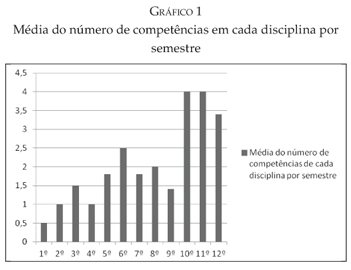Medical education has been the subject of criticisms regarding teaching methods and content. The reason for change is to ensure more efficient training so that graduates are better prepared to deal with problems typical of Brazilian society. This article aims to analyze the content of the action plans for subjects in the curriculum of an undergraduate medicine course, based onthe graduate profile and competences/skills proposed by the National Curriculum Guidelines (DCN) for the medicine course. The material was organized and analyzedthrough the use of content analysis and simple statistics to describe some of the results. The analyses were made per subject, per semester and per stage of the course. It was found that 23 of the 28 competences/skills were present in 62 of 70 subjects. Out ofa total of 70 disciplines,eight did not refer to any competencespecified in the DCN, the other 62 mentioned at least 1 competence.The curriculum is largely based on competences/skills and their gradual development throughout the phases of medical school. Primary Care is a major thrust, covering nine of the 12 semesters; concerned with the technical skills of graduates without ignoringthe social role of the university as well as the doctor-patient relationship, care and multidisciplinary work.
Medical Education; Professional Competence; Curriculum




